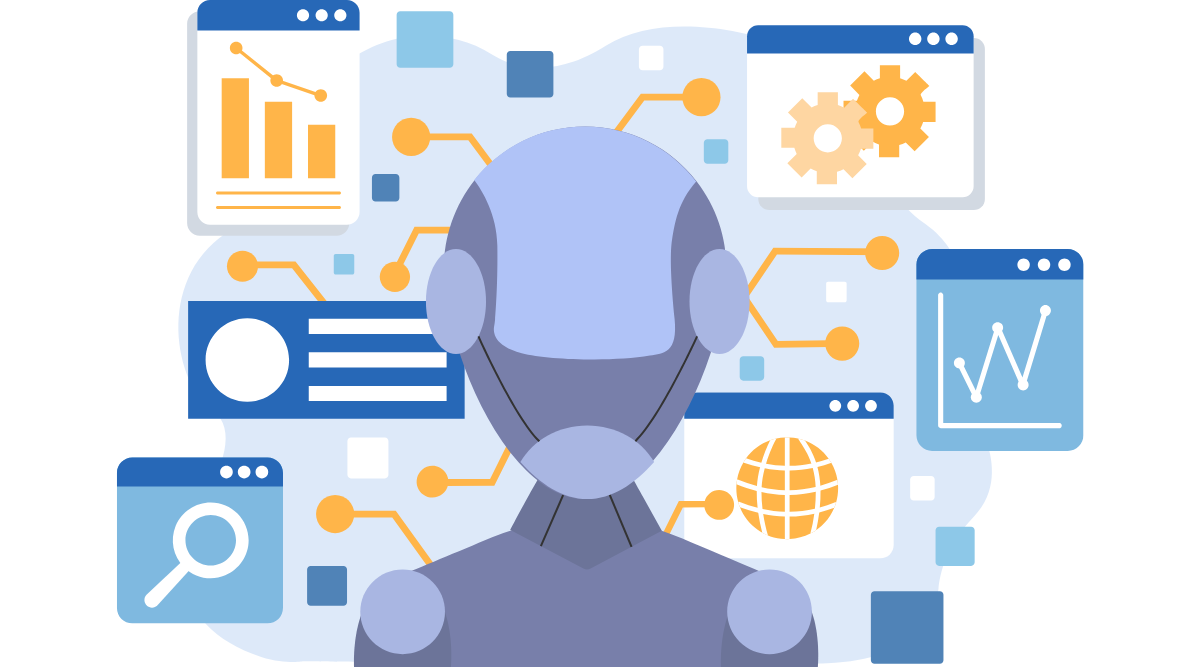Unlocking New Financial Markets: The Role of AI SDRs
Discover how AI SDRs are transforming market entry strategies in the financial sector.

In an era where technology continually reshapes industries, the financial sector stands at the cusp of significant transformation. Artificial Intelligence (AI), with its capacity to analyze vast datasets and predict trends, is becoming a pivotal player in strategic decisions. Among the innovations driving this change are AI Sales Development Representatives (SDRs), which play a crucial role in understanding and entering new financial markets. As these AI-driven tools redefine sales strategies, businesses must explore their implications, challenges, and opportunities. Welcome to a comprehensive exploration of AI SDRs' potential in financial market expansion.
The Growing Importance of AI SDRs in Financial Markets
Evolving Role of Technology in Finance
Over recent years, technology has shifted from simply supporting financial operations to becoming integral to decision-making processes. From algorithm-based trading to data analytics enhancing customer insights, tech integrations are now pivotal. The traditional financial sector, often seen as rigid, is embracing AI tools to achieve more predictive insights and efficiency. The shift is driven by the need to meet clients' growing expectations for personalized and seamless services. Technologies like AI are not merely add-ons but essential components, fostering a smarter, faster decision-making environment.
How AI SDRs Differ from Traditional SDRs
Sales Development Representatives (SDRs) are vital in bridging the gap between marketing strategies and sales goals. Traditional SDRs often rely on manual methods to research prospects, initiate contact, and nurture leads. In contrast, AI SDRs leverage sophisticated algorithms to automate and enhance these processes. By analyzing potential leads and crafting personalized communication, AI SDRs can execute strategies with precision and speed beyond human capacity.
Some key differences include:
- Data Analysis Capabilities: AI SDRs can process massive datasets to identify leads quickly.
- Personalization at Scale: While a human SDR manually personalizes outreach, AI tools can customize communications for thousands simultaneously.
- 24/7 Operations: Unlike humans, AI SDRs function without downtime, ensuring consistent engagement.
Benefits of Using AI SDRs for Market Expansion
Deploying AI SDRs in financial markets offers myriad benefits, ranging from improved efficiency to broader market insights. Here are some notable advantages:
- Cost Efficiency: Automating the initial stages of lead generation reduces the need for extensive manual labor, cutting operational costs.
- Scalability: AI SDRs enable companies to scale their operations without a proportional increase in workforce, accommodating growth spurts effortlessly.
- Enhanced Targeting: With advanced analytics, AI SDRs can identify and prioritize high-value prospects, ensuring efforts are focused where they matter most.
By realizing these benefits, firms can strategically expand their reach into new markets, effectively boosting market penetration and growth.
AI Sales Development Representatives: Transforming Market Entry Strategies
Understanding AI-Driven Market Entry
Entering new markets is a multifaceted challenge, often requiring extensive research and strategic planning. AI SDRs streamline this process by offering granular insights into market dynamics. They do so by analyzing market trends, existing competition, and customer preferences, providing a data-backed roadmap for market entry. AI tools can highlight areas with the highest potential and suggest optimal entry strategies, significantly reducing the risk and uncertainty inherent in traditional approaches.
Why Financial Markets are Ideal for AI SDR Implementation
Financial markets are data-rich environments where trends and patterns evolve rapidly. AI SDRs thrive in such settings due to their ability to quickly process and interpret complex information. Here's why they are particularly suited to finance:
- Dynamic Data Source: The financial sector generates vast amounts of data daily, which AI SDRs can analyze to identify trends.
- Complex Decision-Making: Given the intricate nature of financial products, AI SDRs offer nuanced insights, supporting more informed decisions.
- Regulatory Challenges: AI-powered tools can stay updated with regulatory changes, ensuring compliance in global financial markets.
Key Features of Effective AI SDRs in Finance
An AI SDR tailored for financial markets should possess several core features to maximize its effectiveness:
- Advanced Data Processing: The ability to rapidly process and analyze large datasets for actionable insights.
- Customizable Communication Templates: Dynamic message crafting for personalized client interactions.
- Integration Capabilities: Seamless integration with existing CRM systems to simplify data exchange and workflows.
- Continuous Learning Algorithms: The ability to adapt and refine strategies as new data becomes available, maintaining relevance and accuracy.
Strategies for Breaking into Financial Markets with AI SDRs
Identifying Emerging Financial Markets with AI
In identifying new market opportunities, AI SDRs serve as invaluable tools. They analyze economic indicators, consumer behavior, and competitive landscapes to pinpoint untapped markets. By harnessing AI-driven insights, businesses can make informed choices about where to direct their expansion efforts, identifying high-growth potential areas previously overlooked.
Crafting AI-Driven Market Penetration Strategies
Penetration into new markets requires well-founded strategies tailored to specific environments. AI SDRs support this by crafting strategies based on comprehensive data analyses. These strategies might include targeting specific demographic groups, tailoring financial products to local needs, or leveraging local partnerships to establish credibility and trust.
Integrating AI SDRs into Existing Sales Processes
Integrating AI SDRs into existing sales operations requires careful planning. The focus should be on complementing human efforts rather than replacing them. Key integration steps include:
- Training Teams: Ensuring staff understand AI SDR capabilities and limitations.
- Setting Clear Objectives: Defining what success looks like for AI SDR integration.
- Feedback Loops: Continuously evaluating AI performance and making adjustments based on performance data.

In conclusion, AI SDRs present a transformative opportunity for financial firms looking to expand their market presence strategically. However, while the potential benefits are substantial, successful implementation requires a comprehensive understanding of underlying strategies and careful alignment with existing systems. The subsequent sections of this blog will delve deeper into real-world applications, challenges, and future trends in AI SDR deployment within the financial sector, providing actionable insights for interested stakeholders.
Case Studies: Successful AI SDR Implementations in Finance
Case Study 1: Expanding into Emerging Markets
In the constantly evolving financial landscape, companies like Floworks.ai have spearheaded the integration of AI SDRs to effectively venture into emerging markets. A prominent example is their expansion into Southeast Asia's burgeoning financial sector. Floworks.ai deployed AI SDRs to analyze the region's complex market dynamics, including regulatory landscapes, economic trends, and consumer behaviors.
The AI SDRs identified key opportunities by tracking digital adoption rates and aligning services with local financial regulations. This enabled a streamlined entry strategy focused on high-potential sectors like mobile banking and digital payments, resulting in a significant increase in market share and customer engagement within the first six months.
Case Study 2: Improving Conversion Rates with AI SDRs
Another compelling instance of AI SDR success involves a North American investment firm, which integrated Floworks.ai’s AI SDRs into their lead generation framework. Traditionally, their sales team relied on time-consuming manual processes to qualify potential leads. The integration of AI SDRs transformed their approach by automating data collection and analysis, allowing for real-time, data-driven decision-making.
This shift not only improved lead qualification efficiency but also dramatically enhanced conversion rates. AI SDRs provided personalized engagement strategies tailored to each lead's unique profile, resulting in higher lead-to-customer conversion and increased revenue.
Lessons Learned from AI SDR Deployments in Financial Sectors
These successful deployments highlight several essential lessons for financial firms considering AI SDRs:
- Comprehensive Data Utilization: Adopting comprehensive data analytics empowers firms to identify nuanced market trends, critical for strategic planning and execution.
- Cultural Adaptation: Understanding and adapting to cultural differences in new markets ensures effective communication and customer engagement.
- Continuous Improvement: AI tools' iterative nature means they continuously adapt and improve, offering sustained effectiveness over time.
These lessons emphasize the importance of a strategic approach to AI SDR deployment, ensuring alignment with organizational goals and market realities.
Challenges and Considerations in Using AI SDRs for Financial Growth
Common Challenges in AI SDR Adoption
Despite the promising advantages, adopting AI SDRs presents unique challenges. Some of the most common include:
- Initial Implementation Costs: The transition to AI-driven sales processes can be costly, especially for small and medium-sized enterprises.
- Data Security Concerns: Given the sensitive nature of financial data, ensuring robust cybersecurity measures is crucial.
- Resistance to Change: Teams accustomed to traditional methods may be resistant to adopting AI tools, necessitating change management strategies.
Addressing these challenges involves proactive planning, training, and ensuring that robust systems are in place to mitigate potential risks.
Ethical and Compliance Considerations
Financial markets are highly regulated environments, and any new technology must comply with legal and ethical standards. AI SDRs must be designed to ensure compliance with regulations such as GDPR for data protection and fair trade practices. Ethical considerations also involve transparency in AI-driven decisions and maintaining customer privacy.
Floworks.ai, for example, designs its AI solutions with compliance as a foundational element, incorporating built-in safeguards to ensure adherence to regulatory standards.
Ensuring the Reliability and Accuracy of AI SDRs
The effectiveness of AI SDRs hinges on the accuracy and reliability of the underlying algorithms. Ensuring dependable outcomes involves:
- Regular Performance Assessments: Continuously monitoring AI performance and recalibrating algorithms as needed to align with shifting market conditions.
- Quality Data Input: High-quality, relevant data is essential for effective AI functioning, as data inputs directly influence output reliability.
- Collaboration with Human Teams: Integrating AI outputs with human insights ensures checks and balances, enhancing outcome precision.
Floworks.ai's commitment to excellence is reflected in its rigorous testing and collaboration protocols, ensuring its AI SDRs deliver consistently high-performance levels.
Future Trends in AI SDRs and Financial Market Expansion
The Evolution of AI in Sales
AI technology is rapidly advancing, and its evolution in sales contexts is set to redefine market strategies. Future AI SDRs are expected to integrate deeper predictive analytics, advanced machine learning, and natural language processing capabilities. This will enable even more personalized customer interactions, streamlined processes, and enhanced decision-making abilities.
Predictions for AI SDRs in the Next Decade
In the coming years, AI SDRs will likely become integral to global financial operations, offering:
- Increased Automation: Greater scope for process automation, freeing human teams for complex, strategic tasks.
- Deep Learning Integration: Utilization of deep learning to predict market trends with unprecedented accuracy.
- Enhanced User Experience: More sophisticated customer interaction models personalized to individual preferences and behaviors.
Potential Impact on Global Financial Markets
The integration of AI SDRs has the potential to significantly impact global financial markets by:
- Leveling the Playing Field: Smaller firms can compete with larger enterprises by harnessing AI capabilities to access market insights and optimize strategies.
- Driving Innovation: Encouraging the development of innovative financial products and services tailored to evolving consumer demands.
- Facilitating Global Connectivity: Enhancing cross-border interactions and market entries through efficient, data-driven strategies tailored to diverse regional demands.

As Floworks.ai continues to pioneer AI SDR advancements, the financial world stands poised to embrace these transformative solutions, enabling smarter market engagement and growth strategies.
Conclusion
As the financial sector navigates the complexities of modern markets, the integration of AI Sales Development Representatives (SDRs) offers both an innovative and effective approach to achieving market growth. By utilizing AI SDRs, financial firms are empowered with detailed insights, efficiency improvements, and the capability to engage potential markets like never before. These AI tools provide refined data analysis, personalized outreach on a massive scale, and constant operation without human limitations, positioning businesses to not only navigate but thrive in the competitive financial landscape.
Successful deployment of AI SDRs involves more than just technological adoption; it requires strategic alignment with existing processes and a commitment to utilizing the technology's predictive and analytical strengths. Challenges exist, from integration hurdles to ensuring compliance with regulatory standards, but overcoming these can lead to substantial benefits in market penetration and conversion success.
Floworks.ai stands as an example of how technological innovation is transforming traditional financial practices. By embracing AI SDRs, firms can explore and conquer new markets, supported by accurate, data-driven strategies that propel growth responsibly and sustainably.
The future for AI SDRs is promising, with potential applications continuing to expand as technology evolves. As businesses seek to harness the full potential of these advances, those who adapt and learn will undoubtedly lead the charge in redefining financial market dynamics. The journey with AI SDRs is not just about expansion — it's about setting a new standard for excellence in the financial world.
FAQs About AI SDRs in Financial Markets
What are AI SDRs?
AI Sales Development Representatives (SDRs) are sophisticated tools powered by Artificial Intelligence that automate the early stages of the sales process. They manage prospecting, lead generation, and engagement tasks typically handled by human sales teams, using AI to analyze vast datasets and personalize interactions efficiently.
How do AI SDRs differ from human SDRs?
Unlike human SDRs, AI SDRs operate continuously without downtime, offering rapid data processing and the ability to personalize outreach at scale. They provide insights and make decisions based on data-driven patterns beyond human capacity, automating routine tasks and allowing human teams to focus on complex negotiations and relationship-building.
What industries are best suited for AI SDRs?
While AI SDRs can be beneficial across various sectors, they are particularly effective in industries with large volumes of data and customer touchpoints, such as finance, technology, telecommunications, and retail. These industries benefit from the enhanced efficiency and precision AI SDRs provide in lead identification and client interaction.
Are there any ethical considerations in using AI SDRs?
Yes, deploying AI SDRs involves ethical considerations, primarily concerning data privacy and security. It's essential to ensure that data handling complies with regulatory standards, such as GDPR or other local data protection laws, and maintain transparency with customers about how their data is used. Companies must also consider the impact of AI on jobs and ensure a balance between automation and human employment.
How can financial firms ensure the reliability and accuracy of AI SDRs?
To maintain reliability and accuracy, financial firms should invest in high-quality data inputs and continuously refine their AI systems based on performance feedback. Regular audits, updates, and adjustments to AI algorithms as new data become available are crucial. In addition, fostering a culture of collaboration between AI tools and human expertise can further enhance outcomes and address any potential shortcomings of the technology.


